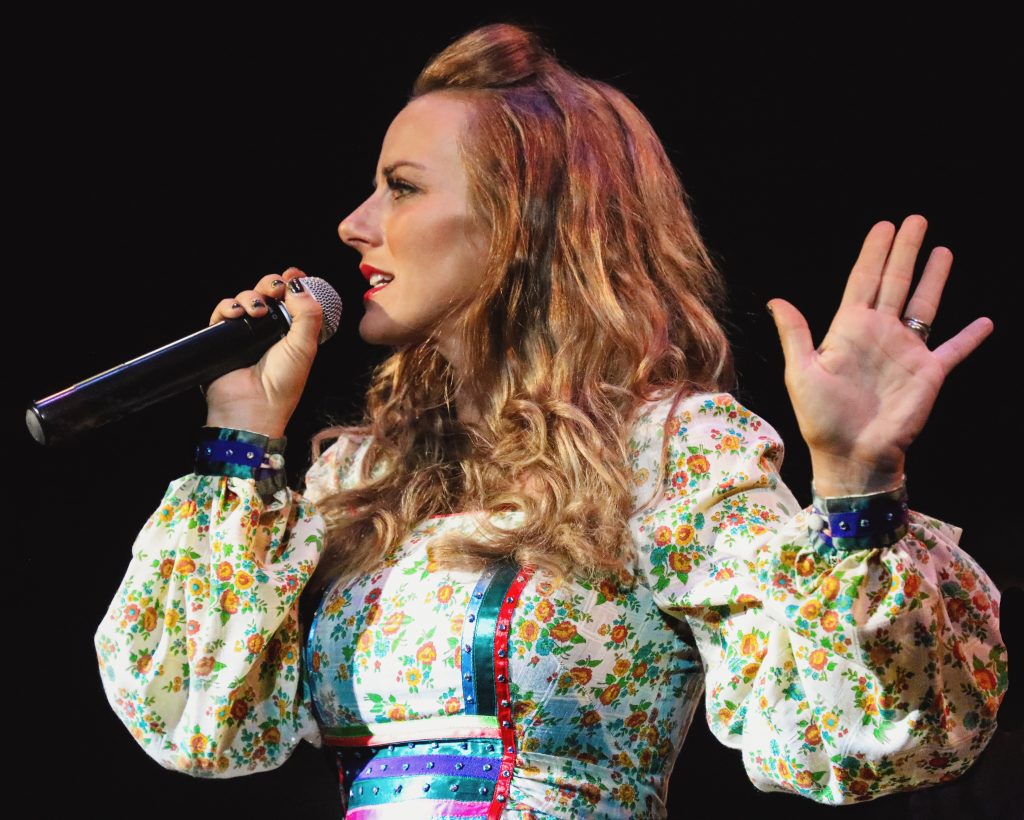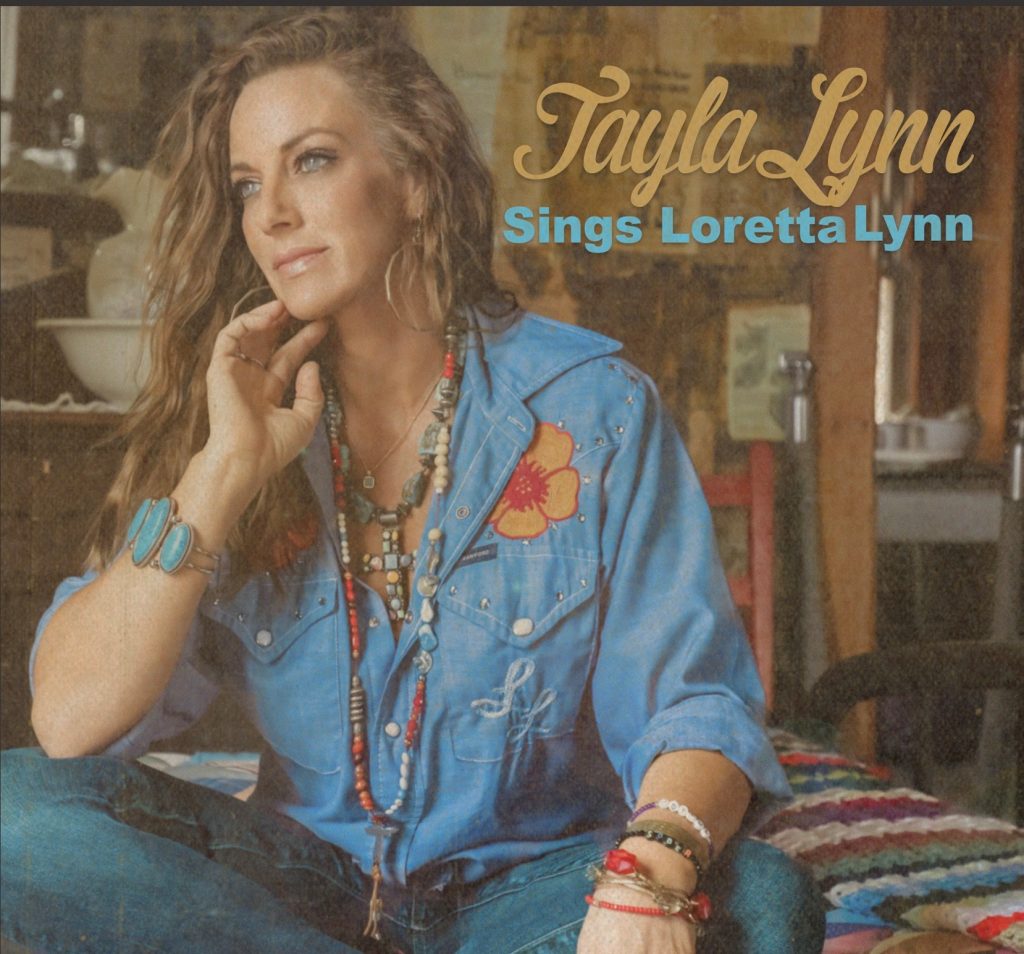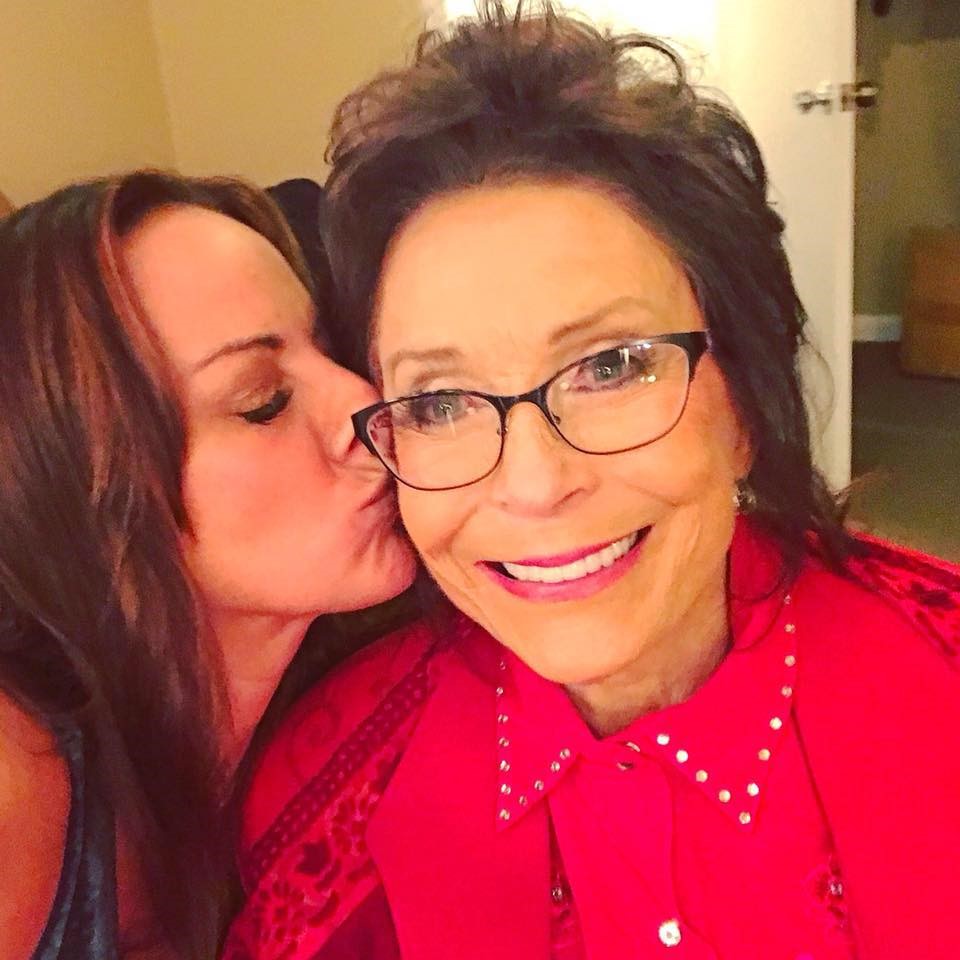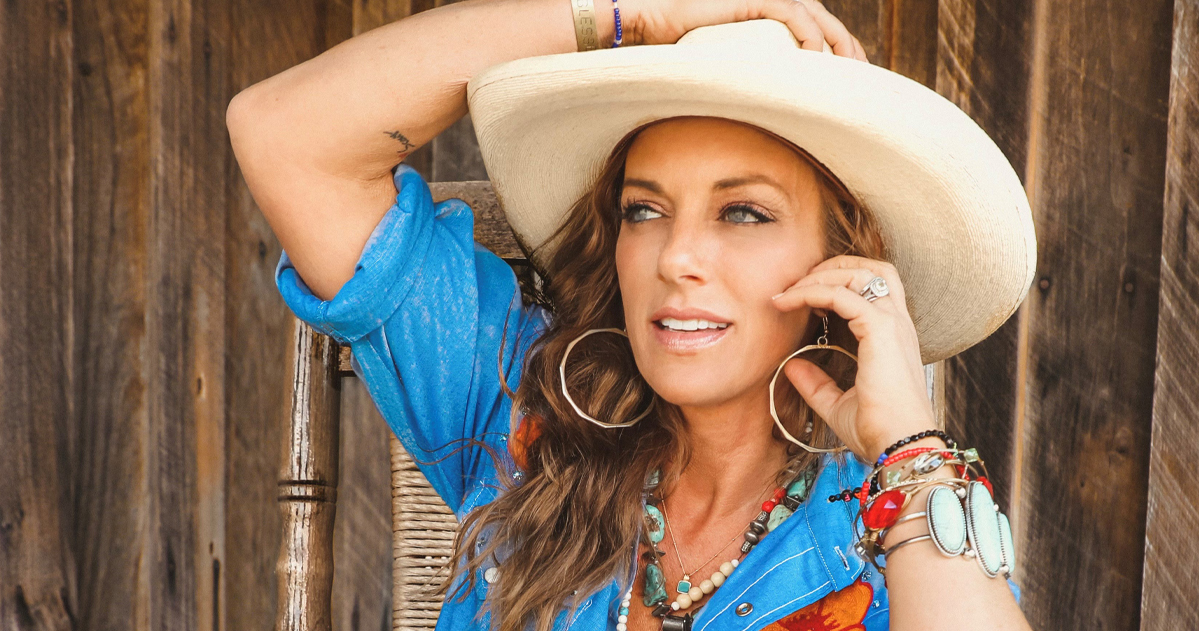Tayla Lynn bears a special tattoo on her arm that reads “to sing is to breathe.” As the granddaughter of country legend Loretta Lynn, it’s a symbolic phrase she lives by, honoring her grandmother’s voice while sharing her own. Like her grandmother, Lynn’s passion for music and humble spirit shine through in our conversation that explores her youthful days living and touring with the country icon, as well as the 44-year-old’s musical journey from being a part of former trio Stealing Angels with Jennifer Wayne and Caroline Cutbirth Hobby to recording her own rendition’s of Lynn’s famous songs on Tayla Lynn Sings Loretta Lynn. In this edition of Female Friday, Lynn reflects on Loretta’s impact, her experience with addiction and the power of showing up.
Tell me about your journey to music. When did you first feel that spark for music?
I think that I always had the spark for music. That is one of the magical things about having a grandmother that’s in the music business and for a little girl to watch her grandmother look like Cinderella in those gowns, of course that’s what you want to do. It was natural for me to want to walk into that. She was so embracing and gracious about it from the time I was little, allowing me on her stage and supporting that and molding it from such a young age that there was never anything else that I thought I wanted to do or really could do.

It seems like you’ve gone through a musical metamorphosis throughout your career. You spent part of your youth opening for your grandmother and then were a member of Stealing Angels and you’ve done solo albums. Talk to me about that journey and finding your artistic identity in all these different phases.
I think when I was younger, all I wanted to do was be on the road with my grandmother. I was such a fan of Loretta Lynn that I wanted to be like her. I didn’t realize she was so left of center until I got older and realized that she paved the way for music, like “The Pill” and “Fist City” and all of that. I think I had to experience and experiment on my own. When I got sober, I really wrote about the demons of my past and what it was like to get sober. That doesn’t necessarily mean I wrote about drinking, but who I was when I put the bottle down, because it’s never about the bottle, it’s about our inside. That took a long time to figure out who I was as a woman. Then when I got married and started having kids, it was the easiest, most natural thing to do in the world was sing my grandmother’s songs, and she allowed it. I can’t say that enough, I would never do this if this wasn’t something that she appreciated and loved and me figure out what to do and what to sing. It’s been so easy. I think in life, if we’ll choose that road that we’ll have struggles, that we should work hard, but it should feel natural to do what’s in front of you. What you choose should feel comfortable, almost like it’s in your skin. It’s been amazing to come back to that music and then to come to meet Tre [Twitty], Conway Twitty’s grandson, and start singing it as a duet and seeing the response of the people. I’ve been trying to build it for a long time and you build slowly and then something will happen. It’s like, ‘this is it.’ I can do some solo stuff and sing Loretta on my own sometimes and then bring it together with the duets, and it’s magical there too.
You brought up an interesting point about doing what feels right and feeling comfortable in your own skin. Looking at all the different phases you’ve been through, do you feel like you were doing what you were meant to be doing or feeling comfortable in your own skin?
I do [Lynn’s] music and I try to do it as authentically as I can as the way she did it. I’m a huge Loretta Lynn fan, so I get a lot of joy and there are such a catalog of songs to choose from so I never get bored. There’s always another Loretta Lynn song I can sing. But I think where I can be my own person and stand out as who am I, it’s social media, Instagram and Facebook. I try so hard to be so present on those forums, and that’s where I get to talk about things that matter to me or try to lift people up or be inclusive in some way or share my family with people. I feel like that’s where ‘yes, I sing Loretta Lynn songs, but here’s who I am.’ If you’ve come to a show, you’re going to see who I am too. I don’t want to be ‘in the shadow.’ I’m so grateful. I get that question so much that I want to say ‘God has given me this amazing shadow to stand in, and in her shadow, I could shine.’ I’ve never said that before, but it’s so true. I go up to her house and it makes me want to cry. I kiss her face, I’m like, ‘Memaw, they missed you so much tonight. They loved you. They said this. They said that.’ Everybody says all this stuff and you can see her light up and want to hear what they said and she’ll send messages back or we’ll do a quick selfie and I’ll say what she said. She’s 89-years-old and I get to cuddle up with her and tell her what people are saying. These are things that you dream of your whole life. I get to sing her songs, I get to go on the road with Conway’s grandson, and we get to hear those amazing stories afterwards when we’re at the meet and greet. We hear so much that’s [about] my family. They’ll talk about Washington state or where she started her career and all these things where my dad was born that are a distant story that I’ve heard somewhere, I get to hear the details. It’s been such a blessing. When somebody hands you something like that and you think you’re wasting it for so long, you’re handed this gift when you’re 19 and handed record deals and all this stuff, and then instead you go wild and you drink them away. You waste them and all looks like it’s lost like, ‘okay, now I’ve aged out, I’m too old.’ Then here it is, I’m 44-years-old and I’m proud to say that, and I am doing better in my career than I ever did, and it’s all because she kept showing up for me and kept supporting me and I finally showed up for myself, and when I did, it all came together. A lot of times in life people will think, ‘it would be so easy if she would step into the light and step into her power and she could do all these amazing things.’ It’s actually easier to step into the darkness and do the same old, familiar chaotic dance with the devil than it is to go ‘I’m not an imposter. I am enough. I am worthy. I can stand in this light and be a light for others.’ When we talk about showing up, some days that’s all I can do. If I do that, I got to show up with God first and then for myself, and then I can start taking care of other people and being of service.
I admire how you are so open about your experience with addiction. Why is it so important for you to share that part of your life?
I think that being an open book and being vulnerable in sharing not just the good, but also those hard times of my life helped keep me sober, helps keep me accountable to myself and others around me. When I shut down on social media, I was very open when my mother passed away. I shared about that grief every day, and that’s where I found comfort was my friends on social media. I think being open about it first and foremost helps me. Secondly, I get so many amazing messages from not just other addicts and alcoholics, but from their families. I think I work more with the families who are lost because a lot of my following is probably around my age. They’re mainly a lot of women and they’re in their forties or fifties, so they have kids that are struggling, and I feel like it’s that whole ‘I get to’ thing. I get to be of service to them, which keeps me out of myself and keeps me out of my addictions and my obsessions with self-hatred or self-sabotage. That’s the biggest gift about being sober is a way to help the next person in line. I’m not always going to do it perfectly and I’m in no way the poster child of what perfect sobriety looks like. I may fall down again, and I can’t promise you that in 10 years I’m still going to be doing it the same way. But for today, I am sober and I want to live a life that spreads joy and is authentic and says ‘let’s normalize that addiction and alcoholism is a disease.’ It’s not because you’re bad, it is a medical disease. You treat diabetes with insulin, you treat alcoholism and addiction with a spiritual experience, whatever that looks like for you. It doesn’t have to be Jesus Christ, but it can be your own conception of God, whatever that looks like. That is the remedy.

What inspired you to make Tayla Lynn Sings Loretta Lynn and record your renditions of your grandmother’s songs?
For the last 10 years, I’ve wanted to make a tribute record. Memaw doesn’t want to call it a tribute because she said she ain’t dead yet [laughs]. I’ve always wanted to do a record of these songs. She helped me figure out what we were going to do. My mom passed away three years ago this month and she sang those songs in the house, like “Black Eyed Peas and Blue Eyed Babies” and “Old Rooster” and “God Bless the Children.” Those were songs that were the soundtrack of my youth, so they had to be on there. Of course we had to do “Coal Miner’s Daughter,” which I got to do as a duet with my Aunt Patsy, one of her daughters, and because I do the duets with Tre Twitty and we’re making that album, I pulled something from the Ernest Tubb duets and did that with this ole silver haired fox, Tony Booth. I did it in Brady, Texas. The indie record label is called Heart of Texas Records and Tracy Pitcox is the head of the label and he is a great friend of Memaw’s and Memaw wanted me to do that record with him. She said, ‘if anybody’s going to be good to you and do you right, it’s Tracy, and this is where we should go.’ We did it during the pandemic. I drove across the country with my two kids. They laid in the vocal booth floor for three days, 10 hours a day, and it was a blast. We ordered pizza and they ate candy and sat on their iPod. It was being with family, it was such an amazing experience. I normally don’t like the studio, so it was so cool. Talk about spiritual experiences when you’re singing, I have a tattoo on my arm that says “to sing is to breathe,” and when I’m not singing and I’m not doing those things, then I’m not fully myself. I felt so in myself and so present during this session, it felt like God was there and mama was there and Memaw. We kept calling her and having her check the vocals and the steel player and all that.
How did you approach these songs and take the meaning that you got from them and channel that into your recording?
I wanted to make sure, this was really important to me, that I didn’t try to change the vibe of what Memaw did on her original recording. A lot of people will take music of people they love and try to make it their own and try to make it a little bit different or a little cooler, and I didn’t want to make it cooler, it’s cool enough how it was. Musically, that was the very first thing that I said. I wanted the background vocals to be like they were on the originals. I really wanted to capture what it was she did, but in my voice. Obviously the voice is going to change, I’ll never be Loretta Lynn. People sometimes say ‘that was a little reminiscent of Loretta,’ but I’ll never be that type of vocalist. She’s a queen and I’m trying to do my little part in the world. As far as channeling what it was, I really sang from my childhood heart. I sang as if my mom was in the room and I was singing her those songs. I sang it as I’d heard it driving down the road in the Firebird on the 8-track when I was seven. I really took it back. Another thing that I did, I’m not really good in the studio. I get nervous and I critique myself too much, so I had a panel of fans on Zoom. I had 20 people on Zoom the whole time so I could perform for a trusted group, for an audience. I think that really changed the whole vibe of everything to where I could feel like I had an audience in there and they hung on with me for days. That changed the vibe too. I’d never done that before, but I will do that forever now.

Is there a song that you feel the most connected to or feel like is most personal for you?
There’s two. One is “God Bless the Children.” That’s such an honest song and such a powerful song, especially when it came out in the seventies. It talks about prostitution, drug addiction, abuse. I think the reason I’m so open is my grandmother writes her whole life story in a book made into a movie, but my mom was also really open with us from a young age. “God Bless the Children” was a lullaby to me when I was a little. My mom sang it every night, so that was so meaningful to be able to sing that song, and I felt God in the room when I was singing it.
The other one was “Here I Am Again.” When I went back out on the road with Memaw for the first time after my grandfather died, we had been living together for about six months directly after he passed away and I never saw her cry. I didn’t think about it very much. We were having a good time, I didn’t see a lot of the grief, or the way that she was doing grief was more through laughter than it was tears. When she got back out onto the road, she was singing “Here I Am Again” one night and she had a big white ball gown on and she wept through the whole entire performance. I was sobbing and I thought, ‘this is where she feels safe. These are her people. This is where she does life is on stage. It’s not really sitting in the house with me necessarily. She does her life on this stage. This is where she grew up.’ “Here I Am Again” for my entire life will be that moment where I understood exactly who my grandmother was and what she meant to her fans. I kept looking at the fans and they were all on their feet and crying with her and going, ‘this is what this is. This is what being on the road for her looks like.’ It was such an awakening. “Here I Am Again,” it’ll always be about an awakening and a connection with her.
What is most important for people to know about you and your story?
I put God first, or at least I try to, before everything. I get out of bed every morning and I hit my knees and I try to turn my will and life over to God. I am then a wife and a mama, and I do my very best at that. Then the whole big rest of the pie is music and spreading joy and trying to be of service where I can be.

